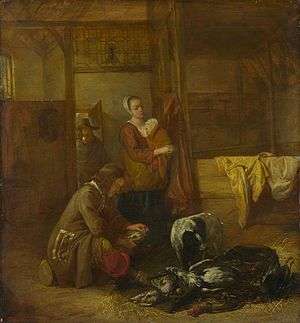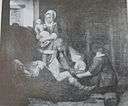A Man with Dead Birds, and Other Figures, in a Stable
A Man with Dead Birds, and Other Figures, in a Stable (c. 1655) is an oil on canvas painting by the Dutch painter Pieter de Hooch. It is an example of Dutch Golden Age painting and is now in the National Gallery, London.
| A Man with Dead Birds, and Other Figures, in a Stable | |
|---|---|
 | |
| Artist | Pieter de Hooch |
| Year | 1655 |
| Type | genre art |
| Medium | Oil painting |
| Dimensions | 53.5 cm × 49.7 cm (21.1 in × 19.6 in) |
| Location | National Gallery, London, London |
This painting was documented by Hofstede de Groot in 1908, who wrote; "269. SOLDIER, A WOMAN WITH A CHILD, AND DEAD GAME IN A STABLE. In the left foreground a soldier, seen in profile to the right, is seated on the floor plucking a dead bird. In front of him to the right is a heap of dead birds, at which a dog is sniffing. In the middle, farther back, stands a young woman with a child at her breast. To her right the soldier's cloak hangs on a post, and behind her to the right another garment, seen in full light, is thrown over a wooden partition. Above the woman's head is a window, between two cross-beams. In the middle of the background a gentleman with long curls, a slouch hat, and a cloak, enters at the stable-door. Panel, 21 1/2 inches by 19 1/2 inches. Exhibited at Leyden, 1906, No. 21. In the collection of F. Fleischmann, London."[1]
According to the museum, X-ray photography shows that the dog and dead birds were painted over the figure of a wounded man.[2]
Modern analysis of the provenance and paint analysis leads to the conclusion that the 19th-century painter Ignatius Van Regemorter (1795–1873) was probably the one who did the overpainting, at some time after he or his father purchased it in 1825. The painting was later sold in 1900 for 85 guineas as a work by Jan Baptist Weenix and was donated to the museum in 1929. It was described in later catalogues as "a collaborative work by Weenix and de Hooch", but there has never been any evidence the two painters worked together.
Wounded man painting
Various provenance records mention a wounded man by De Hooch which were previously thought to pertain to another painting by De Hooch, but could also be this painting.
 A Wounded Man being Treated in a Stable, ca. 1667
A Wounded Man being Treated in a Stable, ca. 1667
References
- entry 269 for Soldier, A Woman with a Child, and Dead Game in a Stable in Hofstede de Groot, 1908
- Pieter de Hooch - A Man with Dead Birds, and Other Figures, in a Stable on museum website
External links
- A Man with Dead Birds research blog by Marjorie E. Wieseman on the museum website